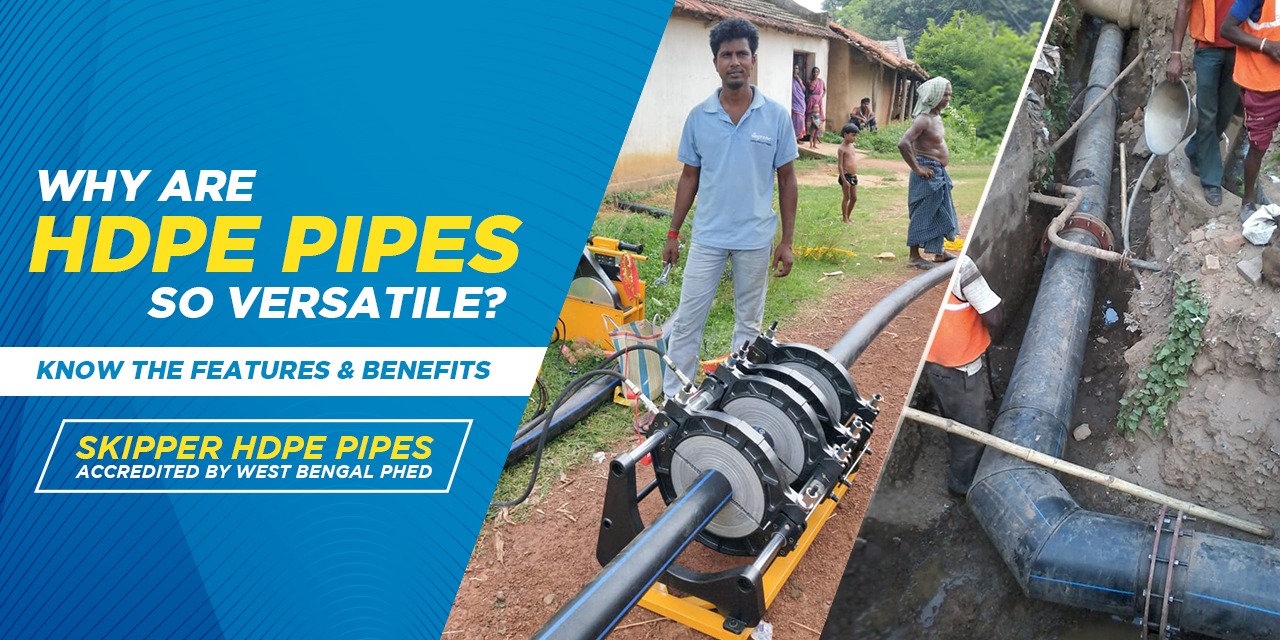Why Are HDPE Pipes So Versatile? Know the Features & Benefits
In this ever-changing world of piping solutions, HDPE pipes shine as the cornerstone of modern infrastructure. As a reliable name in the piping and plumbing industry, Skipper HDPE pipes provides reliable solutions that meet the needs of various sectors. In this blog, we discuss the various benefits, features and applications, of HDPE pipes.
Understanding HDPE:
HDPE pipes, which is short for High-Density Polyethylene Pipes, are a thermoplastic material formed from hydrogen and carbon atoms. This resilient polymer pipes provide great performance, making it extremely flexible, chemically inert, and resistant to corrosion.
Versatility and Applications:
There are many different uses for HDPE pipes across multiple sectors, including agriculture, industry, and households. They are not only utilized for irrigation systems, and water supply networks but they are also widely used in sewage lines, gas distribution, and more. Their corrosion resistance, chemical inertness, and ability to withstand heavy loads make them indispensable in various infrastructure projects.
Key Features and Benefits of HDPE Pipes:
Corrosion Resistance: HDPE pipes remain totally unaffected by corrosion, so they are extremely reliable for long-term use in diverse environments.
Chemical Inertness: One of the features of HDPE pipes is that they are chemically inert, so they’re perfect for conveying a diverse range of fluids without any risk of contamination.
Flexibility: Inherent flexibility is another benefit of HDPE Pipes, so the installation of these pipes is absolutely seamless. This not only reduced the cost of labour, but also brings down the installation time.
Low Maintenance: Maintenance is a factor, when we talk about any type of Pipe. HDPE pipes require the minimum amount of maintenance and as a result of this, they can help in cost savings. Also, the joints are leak-proof, so bacteria and fungi development doesn’t take place.
Strength and Durability: HDPE pipes are very strong, durable, and also extremely lightweight. So these pipes are capable of withstanding very high pressure and heavy loads, without being deformed.
Recyclability: HDPE pipes are not only environmentally friendly, but they are also and recyclable. This helps them score well in the sustainability department and reducing carbon footprints to a great extents.
Applications of HDPE Pipes across sectors:
Skipper HDPE pipes are used widely in different agriculture practices, various industry sectors, and also in households. With this pipe, consumers get a variety of benefits. The water supply is efficient, agricultural productivity is high and the safety aspect is also ensured. So what exactly are HDPE pipes used in? These pipes are used for transporting various chemicals, as well as gases and waste water too. They help in maintaining a clean and safe environment.
Types of HDPE pipes:
They are different PN Grades, in which HDPE Pipes are categorized. This is done on the basis of their maximum pressure tolerance. There is another type of categorization, on the basis of application and the material properties. They are namely – PE 63, PE 80 and PE 100. Different applications require different requirements, so the specific category which matches the particular usage is selected. As a result, users have a wide selection of options to choose from.
Conclusion:
Be it durability or unmatched versatility, HDPE Pipes offer a solution like no other. From excellent weldability to high flow characteristics, the features are simply great. Their durability also makes them highly suitable. When you choose Skipper Pipes, you get a cost effective solution. To know more about their key features and applications, visit this page.


Leave a comment